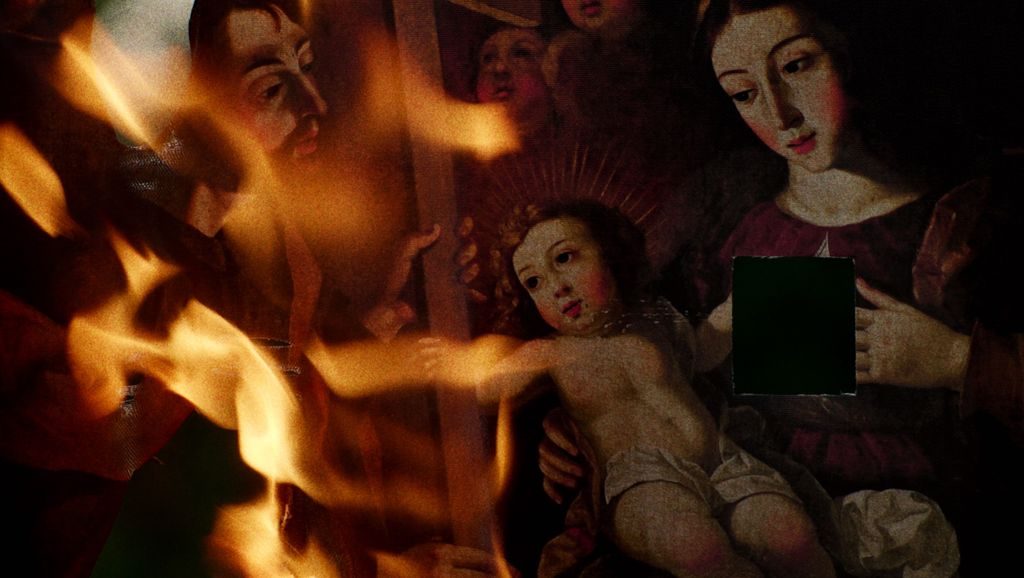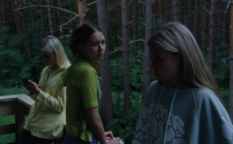Locarno review: Nocturne For A Forest (2023)
Locarno Film Festival
Corti D’Autore

A vanitas on a methodically clothed table opens Catarina Vasconcelos’s experimental short Nocturne For A Forest, a venture into a realm of female forest spirits that inhabit the area where the Carmelite monks lived in the 17th century, denying acces to women.
In the film’s opening scene, hands arranging flowers in a skull central to the still life belong to Pope Gregory XV (1554-1623), a man so eaten up by celibacy and hatred for women, that he had to come up with something the world will remember him for. Striken by a vision of his own death, we are told, he firstly cannonized a number of questionably deserving men, before burning few women at the stake for ‘practicing witchcraft’, none of which was good enough since he was neither the first nor the last cleric to come up with such ideas.
In this opener there is more than meets the eye. Apart from the obvious Memento Mori reference which also serves as a metaphore of The Pope’s contemplation about his own mortality, the set up is a part of the tribute to the work of Spanish-born Portuguese painter Josefa de Óbidos (1630-1684) whose specialty were still lives. Nevertheless, it is her painting of a different kind that will be thoroughly discussed in Nocturne For A Poet: “The Holy Family” (Sagrada Familia, 1664), belonging to Madonna Lactans iconography which honored the maternal nature of the Virgin Mary.
Upon hearing the news of monks bulding a convent in woods of Bucaco in Portugal (1628), Gregory XV came to an idea of how to become immortal. He sent a plaque with his name and following words engraved: “Women are not allowed. Those who enter will be excommunicated. That is, they will go to hell and burn for whole eternity.” In Vasconselos’ fantasy, Carmelite monks are unifed with nature, turning into forest creatures that barely show human features. With bodies fully covered by green leaves and plant roots, they are the invisible keepers of a sanctuary made for men. From the other side of the green wall, tells us the voice of non less than Obidos herself (Paula Guedes): “Women could only see fragments of the gated paradise”. Men, on the other hand could fathom the cycles of life and beauty of small things, the resurrection of Jesus and his death.” They also could share the company of the canvas depicting The Virgin with her exposed, lactating breast, kept in their monastery from the moment it was delivered as the comissioned work.
Vaconselos transports the story to our time where the voice gets muted and transformed into a ‘scored’ conversation between forest spirits, that gets subtitled for the Earthlings. The writer/ director is behind the electronic music composed for the movie, and she also sets for various colour filters to highlight the speakers who all live with memories, their souls lost to another dimension after passing.
“The Holy Family” stands trial, and the chair of the summit proposes to eclipse the artwork in memory of all women who have been eclipsed from it, and to brings it to those who couldn’t see it. Not all spirits are convinced, and finally the painter gets summoned. The subtitled illuminating tonal exchange between female ghosts who became part of the forest formerly inaccessible to them gets heated, and embraces the recognizeable patterns of social media-steered debates. As interesting as the idea is, towards the end it becomes the film’s weakest link. We had too many flames burning artworks to find them compelling, especially those devouring the legacy of women creating under impossible conditions.
With the world premiere at Locarno Film Festival’s Corti D’Autore section, the technically well-executed Nocturne For A Forest has excellent chances of travelling the world.
Original Title: Nocturno para uma floresta
Country: Portugal
Language: Portuguese
Year: 2023
Runtime: 15′
Written/ Directed by: Catarina Vasconcelos
Cinematographer: Paulo Menezes
Produced by: Pedro Fernandes Duarte
Production: Primeira Idade
Line Producer: Leonor Lloret
Editor: Francisco Moreira
Sound Design: Miguel Martins
Cast: Paula Guedes, Jose Aguiar, Mariana Veloso
Music by: Catarina Vasconcelos
International Sales: Portugal Film – Portuguese Film Agency
















